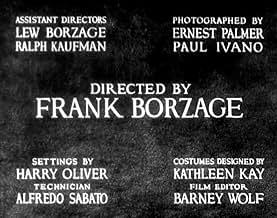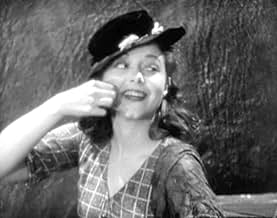NOTE IMDb
7,3/10
2,7 k
MA NOTE
Ajouter une intrigue dans votre langueA woman on the run from the law finds her past catching up to her just as she is on the verge of true happiness.A woman on the run from the law finds her past catching up to her just as she is on the verge of true happiness.A woman on the run from the law finds her past catching up to her just as she is on the verge of true happiness.
- Réalisation
- Scénario
- Casting principal
- Récompensé par 1 Oscar
- 4 victoires et 2 nominations au total
Alberto Rabagliati
- Policeman
- (as Alberto Ragabliati)
Demetrius Alexis
- Museum Waiter
- (non crédité)
Jennie Bruno
- Landlady
- (non crédité)
Gino Conti
- Policeman
- (non crédité)
Dick Dickinson
- Bimbo
- (non crédité)
Frankie Genardi
- Little Boy
- (non crédité)
Helena Herman
- Andrea
- (non crédité)
Avis à la une
Frank Borzage's films often take place in Europa ."Seventh Heaven" took the audience to France before and during WW1.And in the talkies era ,many of his works were depictions of Germany("Little Man What Now?" "Three Comrades" "Mortal Storm" ).
"Street Angel" is a Neapolitan effort.The follow -up to "Seventh Heaven" ,with the same actors ,its first part is a bit erratic,recalling "Heaven" but without its focus and its intensity.But by the second third ,the movie really takes off ;it grabs you when Gino and Angela move into their small apartment in Napoli.And when the girl,about to be arrested,is given one hour's grace,Borzage's movie turns sublime.This hour ...this hour....If it were only for that scene,Janet Gaynor would deserve her AA hands down.This is really one of the most beautiful love scenes I have ever seen: you should see the actress smile ,laugh through her tears ,her intense happiness which she knows will be short-lived: and doing that without any words is a feat which is even more impressive today.
Other remarkable scenes: When Angela is in Jail ,and Gino is desperately searching for her,the director makes a stunning use of the shadows.
The misty harbor "where there are plenty of them (street angels)" where the lovers meet again.
And last but not least ,the painting ("You should not have sold it,it was our guardian angel" ) which plays a prominent part in the plot ;the final harrowing scene in the church is Gina's redemption.A sequence to rival the best of Murnau's "Daybreak" .
Frank Borzage is the poet of the lovers who've got to fight against a hostile world."On the street ,you will find people whose love and pain make great" the director tells us before his story begins.
"Street Angel" is a Neapolitan effort.The follow -up to "Seventh Heaven" ,with the same actors ,its first part is a bit erratic,recalling "Heaven" but without its focus and its intensity.But by the second third ,the movie really takes off ;it grabs you when Gino and Angela move into their small apartment in Napoli.And when the girl,about to be arrested,is given one hour's grace,Borzage's movie turns sublime.This hour ...this hour....If it were only for that scene,Janet Gaynor would deserve her AA hands down.This is really one of the most beautiful love scenes I have ever seen: you should see the actress smile ,laugh through her tears ,her intense happiness which she knows will be short-lived: and doing that without any words is a feat which is even more impressive today.
Other remarkable scenes: When Angela is in Jail ,and Gino is desperately searching for her,the director makes a stunning use of the shadows.
The misty harbor "where there are plenty of them (street angels)" where the lovers meet again.
And last but not least ,the painting ("You should not have sold it,it was our guardian angel" ) which plays a prominent part in the plot ;the final harrowing scene in the church is Gina's redemption.A sequence to rival the best of Murnau's "Daybreak" .
Frank Borzage is the poet of the lovers who've got to fight against a hostile world."On the street ,you will find people whose love and pain make great" the director tells us before his story begins.
"Street Angel" misses greatness by inches. One of three famous late silent movies starring Janet Gaynor (the others were "Sunrise" and "Seventh Heaven"), it's an ultra-romantic melodrama with enormous power. Frank Borzage, a specialist in this kind of film, pulls out all the stops to make this seem almost like an other-worldly fable; the story is painted in broad brush strokes, and the plot has a few echoes of "Les Miserables." The sets and cinematography are outstanding; Gaynor is heartbreakingly beautiful, and her performance is superb. The film's biggest flaw-- almost the only one-- is that near the end it indulges in a wildly improbable coincidence, and it's always awkward when a film closes on a note like that. It isn't quite as good as "Sunrise--" very few movies are-- but for most of its running length this rich, lush film is an absolute joy to watch.
This film was a follow up to 1927's "7th Heaven", starring Farrell and Gaynor, and in my opinion, this film is even better. The Farrell-Gaynor chemistry is so potent that at times (especially when they're dining together in his little apartment) you feel as if you're intruding. The last scene, where Charles is chasing Janet through the fog, is moody, atmospheric--Borzage at his best. An exquisite film.
Street Angel (1928)
What a great surprise!
Just as sound was all the talk and all the necessity of Hollywood, and just as Fox Studios has released a quasi-sound masterpiece in the fall of 1927 called "Sunrise," a few months later comes "Street Angel" continuing in a silent mode from Fox's great director Frank Borzage. And it's lively, fast, well acted, and frankly terrific.
Janet Gaynor above all, like Lilian Gish in her films, lifts this story through sheer acting and screen presence. She's a live wire and a tender victim, a fun and emotional and interesting person. This comes across without the supposed exaggerations of silent cinema, and is enough to make you forget the silence completely. Her partner in all this, Charles Farrell, is also good, though a bit stiff and pretty like Gary Cooper would be a decade later.
Equally terrific is the filming--the photography and editing, and the necessary set design and atmospheric effects (night, fog, great heights, tiny rooms). Photographer Ernest Palmer had already made a slew of films at Fox and was at the top of his game, and he had just worked with Borzage (and Gaynor and Farrell) in the equally well made "7th Heaven" the year before. It's beautiful, glowing, subtle stuff.
The plot? More interesting that you'd expect at first, and more complex, though with a strand of inevitable sweetness, too. The title refers to a prostitute, and streetwalking girls are a recurring part of the film, from the fringes. The place is Italy in the 1920s, and Gaynor plays Angela who turns to the street to try to get enough money to save her mother's life. Things quickly spin out of control from there, with jail and a small time circus and a life of impoverishment in Naples for our two leads. Temporarily. Farrell plays a painter with some talent but imperfect ambition and no business sense, so promise turns to heartache. And then things shift again.
If there is anything constant in this movie it is the good inner souls of the main characters, and so you suspect they will at least have a chance of surviving the hardship that seems to never quite be their own fault. I'm sure most of the audience identified with that then, just as I could now. The scenes are really dramatic, the interactions between the actors completely fresh and honest, and the photography fluid and modern. Yes, it's a sentimental "old" movie, still, of course, but with so much going on so well, you'll be glad.
What a great surprise!
Just as sound was all the talk and all the necessity of Hollywood, and just as Fox Studios has released a quasi-sound masterpiece in the fall of 1927 called "Sunrise," a few months later comes "Street Angel" continuing in a silent mode from Fox's great director Frank Borzage. And it's lively, fast, well acted, and frankly terrific.
Janet Gaynor above all, like Lilian Gish in her films, lifts this story through sheer acting and screen presence. She's a live wire and a tender victim, a fun and emotional and interesting person. This comes across without the supposed exaggerations of silent cinema, and is enough to make you forget the silence completely. Her partner in all this, Charles Farrell, is also good, though a bit stiff and pretty like Gary Cooper would be a decade later.
Equally terrific is the filming--the photography and editing, and the necessary set design and atmospheric effects (night, fog, great heights, tiny rooms). Photographer Ernest Palmer had already made a slew of films at Fox and was at the top of his game, and he had just worked with Borzage (and Gaynor and Farrell) in the equally well made "7th Heaven" the year before. It's beautiful, glowing, subtle stuff.
The plot? More interesting that you'd expect at first, and more complex, though with a strand of inevitable sweetness, too. The title refers to a prostitute, and streetwalking girls are a recurring part of the film, from the fringes. The place is Italy in the 1920s, and Gaynor plays Angela who turns to the street to try to get enough money to save her mother's life. Things quickly spin out of control from there, with jail and a small time circus and a life of impoverishment in Naples for our two leads. Temporarily. Farrell plays a painter with some talent but imperfect ambition and no business sense, so promise turns to heartache. And then things shift again.
If there is anything constant in this movie it is the good inner souls of the main characters, and so you suspect they will at least have a chance of surviving the hardship that seems to never quite be their own fault. I'm sure most of the audience identified with that then, just as I could now. The scenes are really dramatic, the interactions between the actors completely fresh and honest, and the photography fluid and modern. Yes, it's a sentimental "old" movie, still, of course, but with so much going on so well, you'll be glad.
Melodramatic, atmospheric romance with some great tracking shots that look like they influenced Scorsese decades later. Gaynor and Farrell, are extraordinarily well used; this film probably epitomises their appeal better than any other. He's all youthful exuberance, and she's all liquid-eyed yearning. The print I saw had a musical soundtrack with sound effects -- very soupy, but for a take-it-or-leave-it love story like this, just right.
Le saviez-vous
- AnecdotesBy a fluke, this film received Oscar nominations at both the First and Second Academy Awards. It received a Best Actress nomination for Janet Gaynor in 1929, and nominations for Best Art Direction and Cinematography in 1930. It is the only American film to be nominated for Academy Awards in two different years. (A few foreign-language films have received nominations in different years.)
- ConnexionsFeatured in 20th Century-Fox: The First 50 Years (1997)
Meilleurs choix
Connectez-vous pour évaluer et suivre la liste de favoris afin de recevoir des recommandations personnalisées
- How long is Street Angel?Alimenté par Alexa
Détails
Box-office
- Montant brut aux États-Unis et au Canada
- 3 706 000 $US
- Durée1 heure 42 minutes
- Mixage
Contribuer à cette page
Suggérer une modification ou ajouter du contenu manquant

Lacune principale
By what name was L'ange de la rue (1928) officially released in Canada in English?
Répondre
























